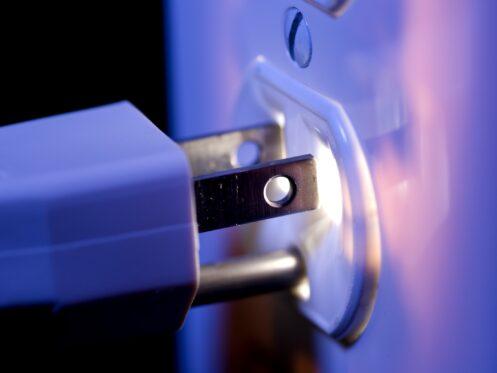Electrical problems in outlets are common. Outlets can easily get overused, leading to unsafe wiring and potential hazards. Luckily, several ways exist to check for and prevent electrical outlet problems. Here are some of the most common issues and how to prevent them:
Loose Wiring
Over time, outlet wiring can become loose, leading to sparks and potential shorts. Loose wires can also lead to overheating and fire hazards. To prevent this, you should call a professional to inspect all outlets regularly for signs of fraying or exposed wires and replace any damaged wiring immediately.
You should also avoid using too many extension cords or plugging multiple devices into the same outlet, as this can cause the wiring to become loose over time. For additional safety, use an AFCI (arc-fault circuit interrupter) – a device designed to detect any arcing or sparking in wiring and shut off the outlet immediately.
No Power Supply
Sometimes, an outlet may appear to have no power even when the rest of your home has electricity. This could be due to a tripped GFCI (ground-fault circuit interrupter) outlet or a problem with the wiring. It could also be due to a faulty breaker or switch.
To pinpoint the source of the problem, a professional electrician will check your circuit breaker and make sure everything is in the “on” position. If the breaker has tripped, they will reset it and check for any loose wires or defective outlets.
To prevent problems with the power supply, you should ask your electrician to ensure that all outlets are properly wired and connected to the right circuit breaker. They should replace any broken or outdated outlets with GFCI-protected models, which can help stop shock and electrocution.
Loose Outlet Connections
Loose outlets are a frequent problem, especially in older homes with outdated wiring. Loose connections are caused by connectors worn over time, often due to heat build-up or corrosion. They can also be caused by poor connections, improper installation, or shifting of the walls in a home. Loose outlets can lead to arcing and sparks, which can cause considerable damage and even start a fire.
Let a professional electrician regularly check all connections and replace worn or corroded parts to prevent loose outlets. If the outlet was improperly installed, they should replace it. Additionally, if you notice any shifting in your walls, it is best to ask them to evaluate the situation.
GFCI Outlet Problems
GFCIs are outlets that help protect against electric shock. They should be installed in wet areas such as kitchens and bathrooms and are designed to shut off the power if a ground fault is detected. GFCIs can be prone to tripping, suddenly turning off without warning. This can be caused by anything from a faulty circuit breaker to a loose wire, so a professional electrician must be consulted if this happens.
To prevent issues with GFCIs, a professional electrician will check the outlets and cords for signs of wear or damage. They will then replace any frayed or worn cords, as these can cause a ground fault. As a homeowner, you should never overload the outlet by simultaneously plugging in too many appliances or devices.
Age-Related Problems
Older homes can be prone to electrical outlet problems, as the wiring and outlets may not be up to code. These can range from loose connections to faulty breakers.
You must regularly hire a professional electrician to update your outlets to prevent age-related problems. The electrician should replace outdated outlets with modern, tamper-resistant models to prevent shocks and electrocution. They should also replace any worn or frayed wiring, which can cause shorts and sparks.
Short-Circuiting
Short-circuiting is a common electrical problem when an electrical current takes a shortcut through the appliance, bypassing the intended path. This creates an overload of electricity, which can lead to dangerous situations. A short circuit can cause sparks, smoke, and even cause fires.
To prevent this, your electrician must see that all electrical outlets are properly grounded and that any exposed wiring is secured and insulated. They should also check for signs of wear and tear to help identify potential problems before they become dangerous. Additionally, they should replace any faulty outlets to ensure your home is safe and secure.
Frequent Light Bulb Burnouts
Light bulbs can burn out prematurely due to loose connections or a faulty outlet. In some cases, a bad connection can cause the light bulb’s filament to overheat, resulting in a shorter lifespan. You might also notice some light bulbs are too dim or too bright. This could be due to a poor connection in the outlet, so it’s best to check all electrical connections before installing a new light bulb.
Always use a light bulb with the correct wattage for your lamp or fixture to prevent this. Additionally, ensure that your electrician checks all connections in the outlet for signs of wear or damage, as this can lead to frequent light bulb burnouts.
Shocks and Sparking
If you’re experiencing shocks and sparks when inserting or removing electrical devices from an outlet, it’s likely a sign of loose wiring or an installation error. The shock may be from live wires touching each other or creating a short circuit. A loose screw in the outlet can also cause them. If you’re unsure what is causing it, hire an electrician to help.
To prevent shocks and sparks, it’s important to use the right type of outlets for your home. If you have an older home with outdated wiring, have a professional electrician replace the outlets with newer models. They can also check for exposed wiring or loose connections and secure them to ensure your home is safe.
Tripped Circuit Breakers
Several things can cause a tripped circuit breaker. It could be an overloaded circuit, a short circuit, or even just a faulty appliance. A tripped circuit breaker can be dangerous, so it’s best to contact a professional electrician immediately.
To prevent tripped circuit breakers, spread the electrical load among multiple circuits, and never plug too many appliances into the same outlet. Also, periodically call in a professional to check your breakers to ensure they are in good working condition and replace any old or faulty wiring.
Electrical Dips and Sags
Electrical dips and sags can occur when too much electricity is drawn from the same area. This can cause devices to malfunction, making it difficult to power certain appliances. Dips and sags can also cause lights to flicker and damage sensitive electronics.
To prevent this, your electrician can install a power factor correction device to ensure that all devices are supplied with the right amount of electricity. They should also inspect any wiring for signs of wear or damage that could be causing the issue. Additionally, they can install surge protectors to help protect your devices from power surges and spikes.
Following these tips can help ensure your outlets run safely and efficiently. Regularly checking for potential problems and hiring a licensed electrical company like [company name] can help you keep your home’s wiring up to code and prevent electrical fires or shocks. We can help you with heater installation and repair, AC installation and maintenance, generator installation, electrical installation and repair, pipe repairs, and ductwork in Raleigh, NC. Contact Thermo Direct today for all your electrical needs.







